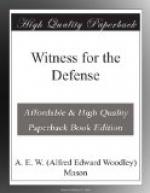“I need not go back on the facts of the trial,” said Pettifer. “They are fresh enough in your memory, no doubt. Your theory as I understand it ran as follows: While you were mounting your camel on the edge of the camp to return to the station and Ballantyne was at your side, the thief whose arm you had both seen under the tent wall, not knowing that now you had the photograph of Bahadur Salak which he wished to steal, slipped into the tent unperceived, took up the rook-rifle—”
“Which was standing by Mrs. Ballantyne’s writing-table,” Thresk interposed.
“Loaded it,—”
“The cartridges were lying open in a drawer.”
“And shot Ballantyne on his return.”
“Yes,” Thresk agreed. “In addition you must remember that when Captain Ballantyne was found an hour or so later Mrs. Ballantyne was in bed and asleep.”
“Quite so,” said Pettifer. “In brief, Mr. Thresk, you supplied a reasonable motive for the crime and some evidence of a criminal. And I admit that on your testimony the jury returned the only verdict which it was possible to give.”
“What troubles you then?” Henry Thresk asked, and Pettifer replied drily:
“Various points. Here’s one—a minor one. If Captain Ballantyne was shot by a thief detected in the act of thieving why should that thief risk capture and death by dragging Captain Ballantyne’s body out into the open? It seems to me the last thing which he would naturally do.”
Thresk shrugged his shoulders.
“I can’t explain that. It is perhaps possible that not finding the photograph he fell into a blind rage and satisfied it by violence towards the dead man.”
“Dead or dying,” Mr. Pettifer corrected. “There seems to have been some little doubt upon that point. But your theory’s a little weak, isn’t it? To get away unseen would be that thief’s first preoccupation, surely?”
“Reasoning as you and I are doing here quietly, at our ease, in this room, no doubt you are right, Mr. Pettifer. But criminals are caught because they don’t reason quietly when they have just committed a crime. The behaviour of a man whose mind is influenced by that condition cannot be explained always by any laws of psychology. He may be in a wild panic. He may act as madmen act, or like a child in a rage. And if my explanation is weak it’s no weaker than the only other hypothesis: that Mrs. Ballantyne herself dragged him into the open.”
Mr. Pettifer shook his head.
“I am not so sure. I can conceive a condition of horror in the wife, horror at what she had done, which would make that act not merely possible but almost inevitable. I make no claims to being an imaginative man, Mr. Thresk, but I try to put myself into the position of the wife”; and he described with a vividness for which Thresk was not prepared the scene as he saw it.




